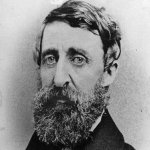Thoreau’s Search for a Hero Leads Him to Thomas Carlyle

I think I’m going to take a break in my Thoreau-a-thon, now that tax season is ramping up.
But before I pause, just one more essay: Thomas Carlyle and His Works.
There isn’t much of Thoreau’s political philosophy in this one, but it demonstrates a few themes that show up elsewhere.
First of these is Thoreau’s eagerness to find a hero.
This is something that I don’t notice much in his later writing (until, in John Brown, he finds the hero he was looking for), but which was certainly evident in his essay on Sir Walter Raleigh and which runs also through this one.
Carlyle wrote the book On Heroes, Hero-Worship, and the Heroic in History, which Thoreau considers his crowning achievement.
While Thoreau as a young man is still looking for a hero to model himself after, he knows that ultimately he will have to cast models aside.
He felt that the problem with religion was that when a Christ or a Buddha discovered something magnificent and important, people then spent their lives celebrating (or arguing about) the discovery but never bothering to try and discover it themselves.
He wrote in his journal:
It is remarkable that the highest intellectual mood which the world tolerates is the perception of truth of the most ancient revelations, now in some respects out of date; but any direct revelation, any original thoughts, it hates like virtue.
The fathers and the mothers of the town would rather hear the young man or young woman at their tables express reverence for some old statement of the truth than utter a direct revelation themselves.
They don’t want to have any prophets born into their families — damn them!
So far as thinking is concerned, surely original thinking is the divinest thing.
Rather we should reverently watch for the least motions, the least scintillations, of thought in this sluggish world, and men should run to and fro on the occasion more than at an earthquake.
We check and repress the divinity that stirs within us, to fall down and worship the divinity that is dead without us.
I go to see many a good man or good woman, so called, and utter freely that thought which alone it was given to me to utter; but there was a man who lived a long, long time ago, and his name was Moses, and another whose name was Christ, and if your thought does not, or does not appear to, coincide with what they said, the good man or the good woman has no ears to hear you.
They think they love God!
It is only his old clothes, of which they make scarecrows for the children.
Where will they come nearer to God than in those very children?
So he appreciated the attitude of people who didn’t merely want to drink from the stream, but wanted to find its source.
In Carlyle’s case, Thoreau used this same appreciation to praise the “Carlylisms” that others found to be ostentatious: “He does not go to the dictionary, the word-book, but to the word-manufactory itself, and has made endless work for the lexicographers.”
“The end of man is an action and not a thought, though it be the noblest,” Carlyle wrote, and Thoreau sums up Carlyle’s philosophy in this way:
One thing is certain — that we had best be doing something in good earnest henceforth forever; that’s an indispensable philosophy.
Well, what did Carlyle do, and what would Thoreau do, in good earnest henceforth forever?
Read his description here of Carlyle and see if you agree with me that with little change it could well apply to Thoreau’s work as well:
In his writings, we should say that he, as conspicuously as any, though with little enough expressed or even conscious sympathy, represents the Reformer class, and all the better for not being the acknowledged leader of any.
In him the universal plaint is most settled, unappeasable, and serious.
Until a thousand named and nameless grievances are righted, there will be no repose for him in the lap of nature, or the seclusion of science and literature.
By foreseeing it, he hastens the crisis in the affairs of England, and is as good as many years added to her history.

Personal and corporate income taxes, excise taxes, payroll taxes… by the time you add them all up and then diffuse them through the economy, it’s hard to know just how much Uncle Sam is taking from you.
Unless you’re Laurence J. Kotlikoff and David Rapson of Boston University, that is.
They’ve done their damndest to follow these taxes from the government to your wallet and figure out how much of your money the federal government is taking from the next dollar you earn.
Turns out it’s 40%.
You weren’t expecting something quite that round and simple, were you?
According to them, the combination of a progressive income tax, a regressive payroll tax, and the various other parts of the tax system more-or-less emulate a 40% flat tax.
There are a few bumps, but almost everyone is within a few percentage points of that.
